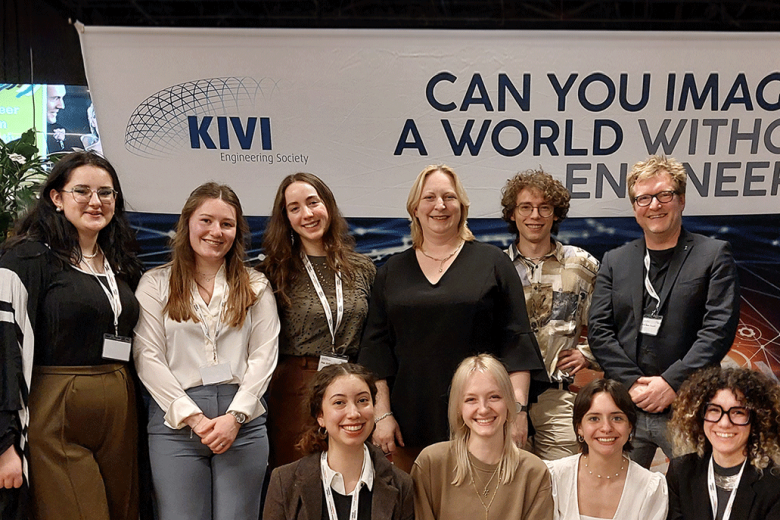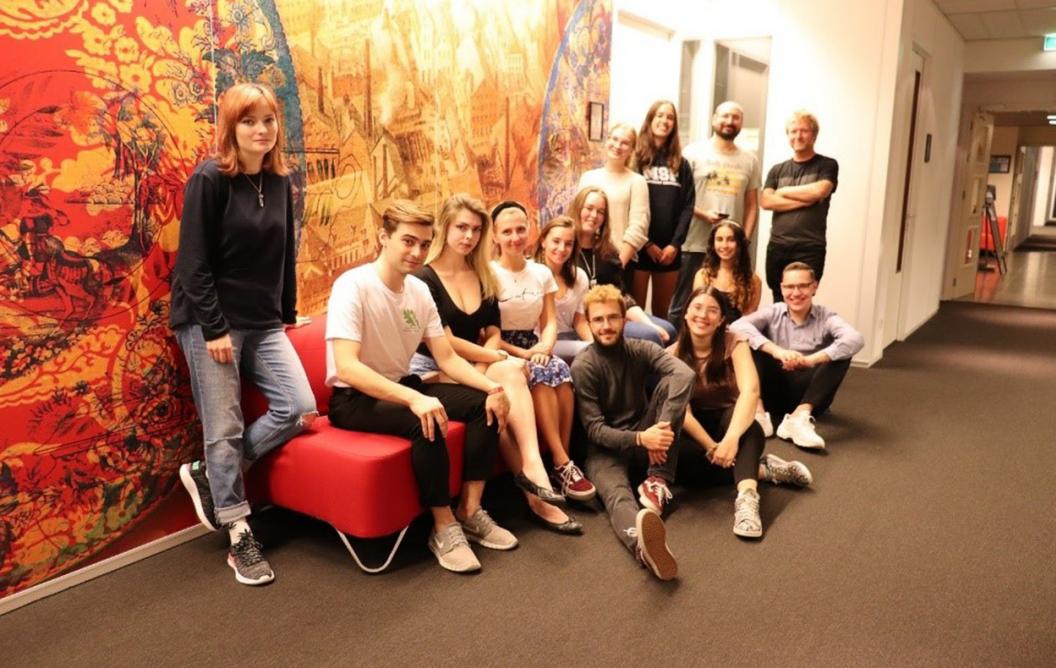Snow white’s apple for the oak processionary caterpillar
The MSP-iGEM team consists of thirteen aspiring scientists. Eleven of these are MSP bachelor's students, one is a bachelor student from the biomedical sciences and one a master student from Systems Biology. On top of that we are guided by two incredible supervisors with strong backgrounds in biology.
iGEM was a special, once a year, selective project that many applied to, so we were eager to get involved and show what we could do. In the yearly iGEM competition, which stands for International Genetically Engineered Machine, student teams from all over the world are given the opportunity to engage in pushing the boundaries of synthetic biology by participating in a cooperative, open community and amicable contest. Multidisciplinary teams consisting of university or high school students work together to develop solutions using the tools that modern synthetic biology has to offer.
In addition, our team did not only have a strong background in biology, but also in chemistry, physics and business. Within iGEM there are many aspects that a team needs to cover during the preparation for the final Jamboree. The Giant Jamboree is where teams from all over the world come together and share the projects that they have been working on for the past 8 months. This was supposed to take place in Boston, but unfortunately due to COVID-19 this year it will take place online.
Solve a prevalent issue
Together with the newly formed team, we started the journey of finding the right topic. As a Maastricht team we wanted to help solve a prevalent issue in The Netherlands, this was when we were introduced to the Oak Processionary Caterpillars. This invasive little critter strips trees bare to their bark making the oaks vulnerable to harsh environmental conditions. In addition, the OPC poses a serious health risk to both humans and other animals as a result of their allergenic bristles. Rashes, severe itching, eye complaints and respiratory issues like asthma are common symptoms evoked by the allergenic protein thaumetopoein, which triggers inflammatory responses. In the most serious cases, bristles even have to be removed surgically from the eyes!
As a consequence of the soft winters and drought that climate change brings along, the OPC returns with vengeance yearly. This global issue seems to be the OPC’s best friend as it allowed the species to expand its territory from its native region in Southern Europe towards all European countries and even parts of the Middle-East. It’s quite the journey, isn’t it? Over the years, the invasive species has become a major local problem in The Netherlands since more than 100.000 people were a victim of the caterpillar in 2019. Municipalities annually have a hard time managing the problem and this is how we came into contact with Jules Sondeijker who coordinates the control of the OPC in the Dutch province Limburg and is connected to the municipality of Sittard-Geleen. Our aim is to develop an insecticide that combats the OPC in the most environmentally friendly way. These current control measures are non-specific, meaning they are dangerous for the caterpillar as well as other species that reside in the same niche. Consequent to this, biodiversity in the area is highly affected enabling the invasive caterpillar to grow in population due to a lack of natural predators. This will result in an imbalance in the population causing a pest.
We started on this endeavor by dividing up into subgroups to cover all the necessary aspects of the project. This included human practices, public relations (eg. YouTube and social media), dry lab, wet lab, wiki, collaborations and funding. This of course came with meetings twice a week throughout the university educational period and summer to manage all the subgroups and workload.
We were successful in raising funds for the project, including receiving the funding reward from Restore & Revive. We created a ‘masterplan’ for human practices, which includes a scientific journal with 42 articles. We managed to put out over 20 videos on our youtube channel (Geneducation), including collaborations with 7 different teams! The dry lab team worked continuously to create models, research the topic and create appropriate lab procedures so the wet lab team could enter the lab without a problem. This of course was inevitable, and problems did occur, like when would we actually be able to enter the lab? How many people could enter the lab? We figured it all out in the end.
What did we actually create?
Our developed product, called OakShield, is a genetically engineered bacterial pesticide highly specific for the OPC. Our aim is for this biological pesticide to target specific and essential sequences in the caterpillar to reduce their growing population and avoid harming other species. For this we take advantage of the cellular mechanism of RNA interference, where specifically designed siRNAi sequences, produced by our bacteria, would target specific gene sequences found only in the OPC genome. By silencing these genes it prevents the formation of essential proteins needed for the OPC survival, preventing the spread of the species.
We wanted to help solve a prevalent issue in The Netherlands, this was when we were introduced to the Oak Processionary Caterpillars.
Also read
-
Prince Friso Engineering Award: UM wins both public prizes
Kim Ragaert and SublimeStone students won the public's awards given out during the Engineer of the Year contest. This triumph as well as the nomination of both, by the Royal Netherlands Society of Engineers, demonstrates that Maastricht University, particularly its only five-year-old Faculty of Science...
-
Champions of change: Vote Maastricht engineers to the top
The Royal Netherlands Society of Engineers has nominated engineer Kim Ragaert and student team SublimeStone for the award of best Dutch engineer and best Dutch student team in 2024. Both are among the last three finalists in their respective categories. Do you want the best engineers to win? Now is the...
-
Maastricht University science students win gold at the international iGEM competition
How do you fix a crack in limestone, such as mergel? Well, simply ask some bacteria to do it for you. In short, this is the goal 11 students from Maastricht University set themselves to do. They succeeded and ended up in the TOP10 best undergraduate projects competing in the iGEM competition. For three...




